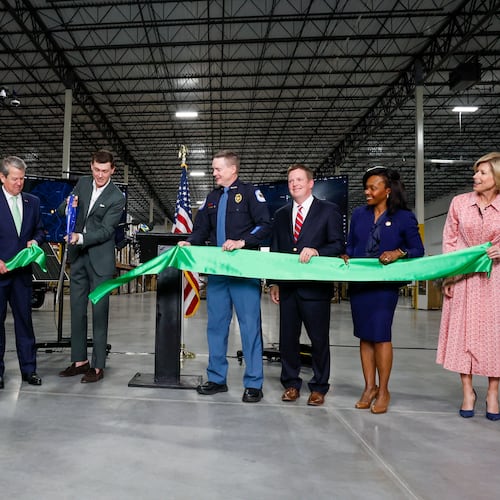A National Transportation Safety Board investigative report on Friday pointed to multiple safety issues that contributed to the fiery derailment last year of a Norfolk Southern train carrying hazardous materials in East Palestine, Ohio, and its lasting effects on the community.
Since the derailment, Atlanta-based Norfolk Southern has faced national criticism, multiple federal investigations and an attempted takeover by an activist investor group — while racking up more than $1.6 billion in charges, including hundreds of millions of dollars to settle lawsuits.
The wreck itself was caused by an overheated bearing that caused an axle to separate, resulting in the train veering off the tracks in the small Ohio town on the night of Feb. 3, 2023. It erupted into a huge fire and prompted the evacuation of thousands of residents. Overheated wheel bearings are the single most common mechanical cause of such accidents, according to the NTSB.
But the NTSB in its report also focused on a decision to conduct a controlled burn of toxic vinyl chloride from derailed tank cars. The burn required even more evacuations and sent up a column of black smoke over the town. The NTSB said the controlled burn, known as a “vent and burn,” was unnecessary.
“In the wake of the derailment, the hazardous materials release, and the subsequent fire, the community of East Palestine, Ohio, was further traumatized by the flawed decision to conduct a rare vent and burn procedure on five hazardous materials tank cars carrying vinyl chloride monomer,” NTSB member Thomas Chapman wrote in a statement in the report, joined by member Alvin Brown and NTSB Chair Jennifer Homendy.
Vinyl chloride exposure is associated with an increased risk of cancer, according to the National Institutes of Health’s National Cancer Institute.
“Undoubtedly, there will be long-term economic harm to the community,” Chapman wrote. “And some fear the massive vent and burn event will result in potential health or environmental impacts which may not be fully understood for years to come.”
The NTSB report said the decision on the controlled burn was made based on information from Norfolk Southern and its contractors, by the East Palestine fire chief who was the incident commander but was not aware of dissenting opinions.
“Lessons must be learned from the chaotic process which lead to the erroneous decision to vent and burn,” Chapman wrote. “Never again should any community suffer the pain of East Palestine.”
In response to the criticism of its decision on the vent and burn, Norfolk Southern said along with its expert contractors, its “only motivation in recommending the vent and burn to the Unified Command was the health and safety of the community and first responders” and that several factors “indicated the strong possibility of a catastrophic, uncontrolled explosion.”
The full report comes after a scathing NTSB hearing held last month on the board’s draft findings on the causes of the wreck and recommendations to improve safety in the future.
At the end of that hearing, Homendy, the NTSB chair, accused the railroad of interfering with the agency’s investigation of the derailment.
Homendy called Norfolk Southern’s “abuse” of NTSB’s investigative process “unprecedented and reprehensible.”
An abstract released shortly after the hearing included findings, a probable cause and recommendations. While the cause was determined to be a defective wheel bearing, the NTSB said other factors contributed to the release of hazardous materials, including problems with a tank car, a delay in telling emergency responders what the train was carrying and the decision to vent and burn.
Vinyl chloride manufacturer OxyVinyls told Norfolk Southern that there was not a chemical reaction in the cars posing risk of an explosion, according to the NTSB.
“The NTSB concludes that NS and its contractors continued to assert the necessity of a vent and burn after expert opinion and available evidence should have led them to reevaluate their initial conclusions,” the report says.
The NTSB issued 34 new recommendations as a result of its investigation — directed at various government agencies, railroads and others — ranging from new requirements for bearing defect detectors to updating instructions for vent and burn decisions.
On Wednesday, Norfolk Southern issued a news release after a visit by Homendy to the railroad’s headquarters. Norfolk Southern said it endorses the NTSB’s safety policy recommendations in its investigation of the East Palestine derailment.
After the full NTSB report was released Friday afternoon, Norfolk Southern pointed to its statement issued after the hearing, in which the company said that it “appreciates the NTSB’s investigation, recommendations for enhancing rail safety and the acknowledgment of the steps Norfolk Southern has taken to improve safety.”
Norfolk Southern also said since the East Palestine derailment, it had installed 187 more hot bearing detectors, 17 acoustic bearing detectors and three digital train inspection portals.
The railroad said it would “move quickly to compare the NTSB’s recommendations to our current protocols and will implement those that advance our safety culture.”
About the Author
Keep Reading
The Latest
Featured



